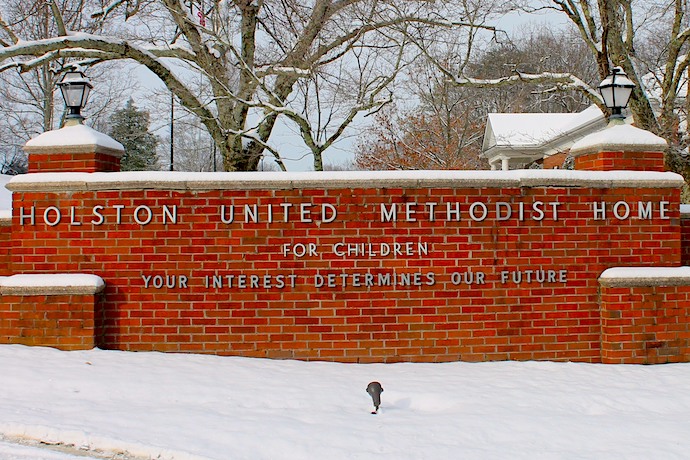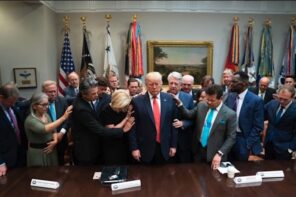Christian Right legislation that has often seemed to be aimed at undermining or rolling back LGBTQ rights in the name of religious freedom, has also often been about much more. This has become particularly clear in state legislation affecting adoption and foster care. The very meaning of religious freedom is at stake and the definitional battle lines become clearer with every passing controversy.
The most recent dispute is the result of legislation signed into law by Gov. Bill Lee of Tennessee in 2020. The law allows state-funded child-placement agencies to decline to facilitate cases that “would violate the agency’s written religious or moral convictions or policies.”
It took only two years for a Jewish couple to be denied adoption services by a state-funded Christian child-placement agency that resulted in a lawsuit.
The complaint, filed by Americans United for Church and State on behalf of Elizabeth and Gabriel Rutan-Ram, says that state funding of child-placement agencies that discriminate “against prospective or current foster parents based on the religious beliefs of the parents” violates the Tennessee Constitution.
The slippery slope
The legislation is a slippery slope—and the slope extends far beyond matters of LGBTQ equality that have received the most attention. While the courts have yet to settle the matter of where religious freedom ends and discrimination begins, Tennessee was not the first such instance of religious discrimination by a child-placement agency.
In 2019, USA Today reported on Aimee Maddonna, a Catholic woman who was denied the opportunity to volunteer at a state-funded evangelical agency in South Carolina. She had hoped to use the experience to learn what it would take to become an adoptive parent. But that was not to be.
Americans United for Separation of Church and State now represents four families who were turned away by taxpayer-funded foster care agencies because they didn’t share the agencies’ religious beliefs. In addition to the above cases, Church & State magazine reports that AU has also taken on the cases of “Kelly Easter in Tennessee and Fatma Marouf and Bryn Esplin in Texas [who each] wanted to provide foster homes for refugee children, but they were refused service by taxpayer-funded agencies working under federal contracts because the women are LGBTQ.”
All of the cases involve the use of state or federal funds. When the Tennessee bill was introduced, Pam Kelner, the executive director of Jewish Family Services, told The Tennessean, “If you’re raising your funds privately you have the right to decide who you’re going to serve and not going to serve. When it gets to programs that are publicly funded—that oversteps the separation of church and state.”
Her words proved to be prophetic.
“It’s infuriating to learn our tax dollars are funding discrimination against us,” Gabriel Rutan-Ram said. “If an agency is getting tax money to provide a service, then everyone should be served—it shouldn’t matter whether you’re Jewish, Catholic or an atheist. We’re all citizens of Tennessee, regardless of our religion.”
Defenders of the bill deny that it’s discrimination to deny anyone service who doesn’t conform to their doctrines. Bradley Williams, president of the formerly Methodist-affiliated, Holston United Methodist Home for Children said in a statement quoted in The New York Times, that the agency is “committed to Christian biblical principles” and “places children with families that agree with our statement of faith.”
“We view the caregivers we partner with as extensions of our ministry team serving children,” Williams continued. “So from the very beginning, we seek to find alignment with them, and if we cannot do so, we try to help them find an agency that may be a better fit.”
Project Blitz: The marketing agency
The Tennessee bill happens to closely resemble a model bill, called the Child Protection Act, which has been distributed by Project Blitz, a Christian Right state legislative campaign first reported on here at RD. (Project Blitz has lowered its profile, but remains active and is monitored by Blitz Watch.)
The sponsor of the bill denied to The Tennessean that it was based on the Project Blitz model, claiming instead that it was based on Virginia legislation from 2012. In fact, parts of the Virginia bill and the Tennessee bills are identical while the Project Blitz model’s language is somewhat different but the same in intent. The Project Blitz playbook includes, however, links to the extant state legislation on which they based their model bill—including Virginia’s. So it’s possible that Tennessee got the Virginia language via Project Blitz. There may be similar stories elsewhere too, since Project Blitz has functioned as a legislative marketing mechanism on this and a host of Dominionist-driven Christian nationalist legislation in recent years.
Project Blitz has always sought to craft their model bills from the most successful versions of Christian Right legislation—proposed as well as passed. The Project Blitz playbooks specifically cite “acts already on the books” from which they drew to craft their models. The 2017-18 manual states, regarding the model Child Protection Act:
“The model act borrows from several acts designed to strengthen and protect child placement options.”
The manual lists state laws from Alabama, Michigan, North Dakota, South Dakota, Texas, and of course, Virginia. The most recent available Project Blitz manual (exposed by RD in 2021) adds Kansas and Oklahoma to the list of states that have adopted similar legislation.
The title of the Project Blitz model bill has since been changed to the “Child Welfare Maximization Act,” perhaps in an effort to underscore that adoptive and foster care children are in need of maximum protection from LGBTQ people, Catholics, and Jews.
One of the political “talking points” intended for legislators, that accompanies the model bill in the playbook, claims, “This act is designed to strengthen child placement options in a pluralistic culture.” There’s certainly nothing pluralist about excluding people of other faiths. But just as with religious freedom, that may be a matter of who gets to define it.
What’s wrong with this picture?
The growing departure from historical, common sense understandings of the meaning of religious freedom is on vivid display in the Tennessee case. Outside of the legislature and the courtroom, the contour of the public debate is more like this:
One side is epitomized in an op-ed by Todd E. Brady, vice president for university ministries at the Southern Baptist-affiliated Union University, which appeared in the local Jackson Sun.
“I realize that there are some who say that religious liberty (protecting a person or organization’s freedom to operate according to their convictions) is merely a guise for discrimination. This kind of thinking, though, is misguided. Proponents of religious liberty do not want to treat others badly. They simply want the freedom to act in accordance with their conviction. A personal conviction is not the same thing as an attack of discrimination.”
“Personal conviction,” as Brady would have it, of course, doesn’t give us the right to exempt ourselves from the laws protecting the rights of all. Or at least it shouldn’t.
But the Tennessee legislation allows state funds to go to institutions that refuse to provide state-funded services to people whose sexual orientation and/or religion they disapprove of. That means that all taxpayers, of all religious traditions and none, are required to underwrite the “personal conviction” of those who refuse to conform to the letter and spirit of the state and federal constitution.
A traditional and common sense meaning of religious freedom is epitomized by an op-ed in The Tennessean by three gutsy Methodist high school students, Emma Anne Stephens, Tate Keuler, and Natalia Del Pino. They write about adoption discrimination at the Holston United Methodist Home for Children. The students invoked historical Methodist views on religious freedom and antisemitism against the Methodist Home’s action.
Quoting from the Methodist “Book of Discipline” they write:
“We condemn all overt and covert forms of religious intolerance, being especially sensitive to their expression in media stereotyping. We assert the right of all religions and their adherents to freedom from legal, economic, and social discrimination.”
The good news for proponents of authentic religious freedom for all is that there’s a throughline from Thomas Jefferson and James Madison’s core idea of religious freedom to the values of Emma Anne Stephens, Tate Keuler, and Natalia Del Pino and the United Methodist Church’s Book of Discipline.
The Founders believed that one’s religious identity should neither advantage or disadvantage citizens under the law. And so do young Methodists in the 21st century.





